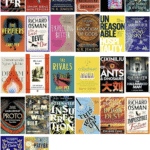People are proud to belong to all sorts of places: their country, their city, their side of the river, their local area. Granted, it’s not very British to love being British, but one might well hypothetically imagine a Londoner feeling oh-so-very-Londony all the bloody time. (It was only an example. I’m sure we’re not at all annoying like that.) Furthermore, it’s all but impossible to live in, say, Willesden without spending at least half the time musing on how awful it would be to live in Neasden, Harlesden or Kilburn, and how if you were ever forced to live in any one of these places you’d rather have your brain painfully extracted through your nose with a cocktail stick than spend another living minute in that awful hell-hole, although of course if you did ever suffer the unfortunate indignity of being relocated to Neasden, Harlesden or Kilburn this would immediately be transformed into an astonishment that you survived what you would come to call your ‘difficult early years’ in the wastelands of Willesden Green.
Enough. My point is that – with all of these shifting alliances and identities – it is an all the more astonishing failure of one particular unit of political geography to engender any real feeling whatsoever. I speak, of course, of the local council, and more specifically the London borough council.
No one, to my knowledge, has ever gone to war to defend the honour of Bexley, or got into a heated dinner party argument over whether Islington or Lambeth was ‘London’s second borough’. Perhaps this is because the London borough councils are a self-evidentially ridiculous division of a city which bears no real relation to people’s actual needs. Or, perhaps, it’s because their unique cultures have not been properly studied and then lovingly presented to the world. And because language is such an intrinsic part of any cultural identity, I’d like to do my part by sharing with you a dictionary of Brenglish: words and phrases used extensively by the London Borough of Brent which might at first glance appear to simply be part of (oppressive, colonial) ‘standard English’ but in fact have their own distinctive flavour within the fair administrative zone of Brent. (Many thanks to my mother, by the way, who over the years has contributed more than anyone to the extensive study of this fascinating dialect.)
~
A Dictionary and General Guide to Brenglish
~
Ask Rob – classic comedy which was formerly published within the pages of the august ‘Brent Magazine’. Each month the eponymous Rob would respond to another set of increasingly absurd consumer enquiries with deadpan seriousness, as if the matter was a complex and sophisticated judgement requiring extreme cerebral command rather than the most banal suggestion that you probably haven’t won the Nigerian lottery.
Cultural Note: most critics agree that ‘Ask Rob’ jumped the shark when the protagonist was replaced by the lesser ‘Ash’.
barnet – a wealthy neighbour.
Usage Note: usually pejorative. To describe someone as a barnet is to suggest that, although he or she may be rich, successful and outwardly well-adjusted, there is something intrinsically defective about him or her, although it may not be possible to articulate or explain exactly what.
box office – office contained within a small wooden box.
Brent Cross – pagan temple to the retail gods, named after one of the many London boroughs in which it is not located.
Camden – mythical land in which happiness and contentment reigns. There is great dispute in Brent over whether Camden is a real place or simply an invention for the sake of simple folk.
Dogshit Park – entirely official and legitimate name for a patch of grass in the Queen’s Park area.
Johnson, Boris – villainous pantomime character who currently masquerades as the Mayor of London whenever his real job as Daily Telegraph columnist will allow. (See also: Livingstone, Ken)
Jubilee Line – a weekend bus service.
Fun Fact: still superior to the Bakerloo line in every sense.
library – a collection of subsidised computers which may be used to display a list of books available for borrowing in other London boroughs.
Livingstone, Ken – the Mayor of London. (See also: Johnson, Boris)
local newspaper – a public journal of record for major criminal offences, usually involving multiple deaths.
MP – ‘Member of Parliament’, an elected office which primarily carries the responsibility of distributing printed material depicting graffiti and littering within the local area.
paving stone – artistic installation, usually presented at an unusual or unexpected angle.
Queen’s Park – the setting for an obstacle course of acquaintances. One navigates Queen’s Park successfully through speed and courage.
Queen’s Park Area Residents’ Association – shadowy organisation whose ultimate ends are unknown but whose means appear unlimited.
Cultural Usage: a young Brentian may be effectively disciplined by threatening to “report you to the residents’ association!”
Queen’s Park Community School – school which has ‘changed a lot’ since you were ‘forced’ to send your children elsewhere.
residents’ parking area – synonym for ‘road’.
silverlink – a product or service that is usually free but of poor quality.
silverlink rider – a person with silverlink dependency, whether as a lifestyle choice or through necessity. Silverlink riders are characterised by the clear physical signs of brooding melancholy and intermittient nervous shaking at the (often wholly imaginary) prospect of being required to pay for their silverlink.
Usage Note: once common, these terms have become increasingly archaic and may not be recognised by a younger speaker of Brenglish.
Teather, Sarah – the ‘youngest ever’ everything.
time – time in Brenglish is measured in an unusually relativistic fashion which is dependent on the observer’s moment of comprehension. If a piece of construction work is described on a sign as taking ‘six weeks’, for example, this is calculated as six weeks from the moment at which the sign is read. If you re-read the sign once after three weeks, for example, the work will take approximately nine weeks in total. (Please note: ‘week’ is used here in the sense of a ‘Brent week’, a period of time considerably longer than the conventional English ‘week’.)
Usage Note: the use of absolute dates – such as ‘Wednesday, 9th September 2009’ – is considered extremely bad form in Brenglish and is strongly discouraged.
Willesden Green Library – a famous al fresco pub, home to many of Brent’s veteran drinkers.
zebra crossing – road markings indicating that an intelligent point at which to cross the road is located somewhere nearby.
~
Any further contributions gratefully received!







This is a really Nic-like post. xxxxx
Don’t say that in a tone of despair
(Sweeping generalisations, Batman! Doesn’t this poster realise that Willesden Green got the wrong end of the library stick, and that other library centres (Kilburn’s, for example), have books?)
Brent Magistrate’s Court- A monument of great importance to many Brent "citizens," this imposing building in the middle of a roundabout is a tribute to the many lost during the Poll Tax Wars. Indeed, it serves today as a recreation of the faulted and disfunctional bureaucracy that was popular during these wars, in order to educate children in their local history.
I’ve never lived in Brent… I am of course a child of Wandsworth, which is infinitely superior to Brent…
Brent Museum – visitor-less library annexe
kill burn – irrational desire to murder one’s near neighbours
I did much LOLing while reading this. Nothing of substance to contribute though, as usual!
x